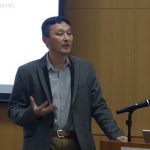開催報告:本セミナーでは、サステイナビリティに向けたデータ駆動型イノベーションを促進していく上での、データ・ガバナンスや公共政策における可能性と課題について、グローバルな観点から議論を行った。特に、サステイナビリティに関わる様々な課題に関する特性を紹介し、データ駆動型イノベーションがどのようにこうした課題に対応することが可能であるのかを議論した。日本、中国、欧米における実際の事例も踏まえながら、データの収集、管理、使用に関わるデータ・ガバナンスの仕組みが、データ駆動型イノベーションの創出にどのような影響を及ぼすのか、さらにデータ・セキュリティやプライバシーなどに関する社会的懸念にどのように対処することができるのか議論した。今後、気候変動などの課題に向けたデータ駆動型イノベーションを促進するためのデータ・ガバナンスに関する公共政策と制度設計の影響について検討した。(香港科技大学公共政策学部准教授 鎗目 雅)
ーーーーーーーーーーーーーーーーーー
◆日 時:2021年 8月31日(火)13:00-14:30(日本時間)
◆場 所:Zoomによるオンラインセミナー(事前登録者のメールアドレスへ前日までにZoom URLを送ります)
◆お申込:要事前登録。こちらの*登録フォーム*からお申込み下さい。(※登録フォームがうまく開けない場合はメールにてSTIG@pp.u-tokyo.ac.jp宛てにお名前とご所属をご記入の上、お申込みください)
◆言 語:英語(英語⇔日本語の同時通訳あり)
同時通訳アプリinterprefyをインストールしてお聞きください。詳細はZoom URL送付時に説明します。
【概要】
Data-driven innovation, including the Internet of Things (IoT), blockchain, and artificial intelligence (AI), has significant potential to address various challenges identified in the Sustainable Development Goals (SDGs). Smart energy grids based on blockchain make it easier to integrate renewable energy sources and balance energy supply and demand smoothly, improving energy efficiency and reducing carbon dioxide emissions and air pollution. Smart infrastructure monitoring systems equipped with IoT sensors enable us to measure weather conditions precisely and strengthen urban resilience to natural disasters such as floods and typhoons. AI-based medical devices support conducting diagnosis and treatment efficiently, providing accessible and inclusive health services to all.
As environmental, economic, and social aspects are increasingly interwound, various kinds of data that are getting available from a variety of sources through sophisticated equipment and devices need to be deployed effectively to tackle multifaceted sustainability goals and targets. It is hence critical to collect, share, and use relevant data through cooperation and collaboration among stakeholders. The open data policy will facilitate data disclosure and exchange, contributing to creating innovation.
There are many policy challenges, however, that we need to consider in properly utilizing data for innovation for sustainability. Technical issues related to data, such as metadata tagging, quality control, cleaning and error elimination, and interoperability between various standards, must be addressed to support data sharing. Stakeholders have different interests and motivations and would not necessarily be willing to disclose or exchange data with each other, which would require us to consider a proper balance between open and proprietary data. Serious concerns are also raised about dealing with sensitive data in terms of security and privacy. Micro-targeted nudging for sustainable behavior based on detailed personal data could involve manipulation or paternalism.
Various policy approaches can be considered for data governance. The government can be in charge of governing public data, whereas platform enterprises in the private sector also play a critical role in assembling and managing an increasing amount of data. A data trust can be established as an independent institution to make decisions about who has access to data under what conditions, how that data is used and shared for what purposes, and who can benefit from it. Transparency and citizens’ participation and engagement in the processes of data governance are particularly emphasized in encouraging social acceptance and inclusiveness in pursuing sustainable objectives.
Data-driven innovation poses a difficult challenge to policymaking. The speed of technological change is rapid, and the path of its evolution is not entirely predictable or explainable. That would produce a widening gap between technological change and institutional readiness. Also, various sectors, including energy, transportation, and health, which were not connected previously, are increasingly integrated through data in cyber-physical systems. Novel policy approaches, such as regulatory sandboxes, would be required to incorporate the ability to learn from real-world use and experience and improve performance through adaptation. In-depth research needs to investigate what kinds of policy frameworks and measures would be effective in collecting, sharing, and using data among stakeholders and what impacts would be made on facilitating data-driven innovation while addressing societal concerns, including data security and privacy.
In this seminar, we discuss theoretical and empirical approaches to examining policy frameworks and measures to facilitate data-driven innovation and address critical issues involved, such as the ownership of and accessibility to data, interoperability and integration of data, incentives to the collection, disclosure, and sharing of data, the protection of data security and privacy, and trust and engagement in data governance. Implications for public policies and strategies are explored for maximizing the potential of data-driven innovation while minimizing risks to individuals and communities in moving towards sustainability.
【講師】鎗目 雅 先生/香港科技大学准教授
http://yarime.net/
https://ppol.ust.hk/ppl/faculty/prof_masaru_yarime
◆YARIME Masaru, Associate Professor, Division of Public Policy, The Hong Kong University of Science and Technology; Honorary Associate Professor, Department of Science, Technology, Engineering and Public Policy, University College London; Visiting Associate Professor, Graduate School of Public Policy, The University of Tokyo

——————–
お問い合わせ:
東京大学 科学技術イノベーション政策における「政策のための科学」教育・研究ユニット
STIG事務局(STIG@pp.u-tokyo.ac.jp)